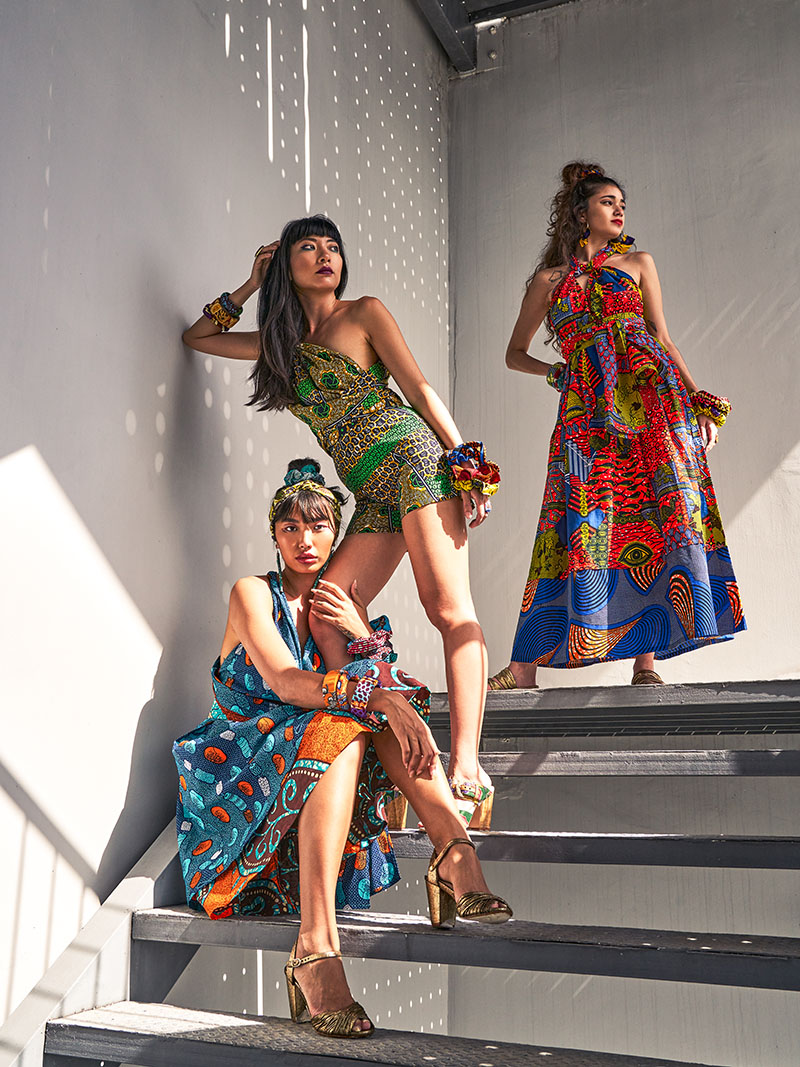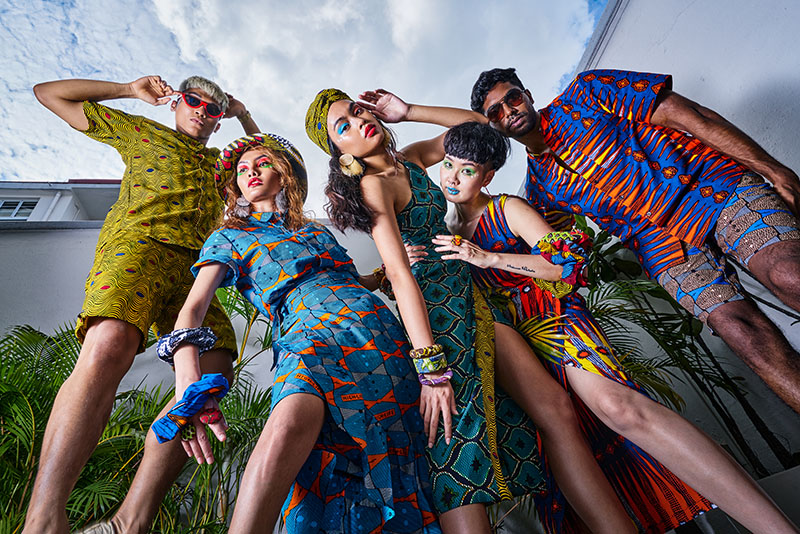Ifeoma Ubby’s journey into fashion was quite unusual. She originally came to Singapore as a molecular biologist with the intention of finishing her work in cancer research. But while getting ready for her wedding in 2016, she began to notice the lack of African fashion and fabrics available in Singapore. With a mission in mind to fill this gap in the market, OliveAnkara was born.
The label is best known for its Afromonos and cheongsams made of Ankara fabric, wax-printed textiles from West Africa. From the utilisation of Italian craftsmanship to the mixing of Asian and African designs, the fusion of cultures is a strong element in OliveAnkara’s DNA. The opening of OliveAnkara’s first showroom in 2019 marked a major milestone in the brand’s journey to bring African culture and design to a Singaporean audience, championing both cultural diversity and sustainability in its approach. Three years since the label’s inception, OliveAnkara has since amassed a considerable fanbase in Singapore.
Speaking to Vogue Singapore about OliveAnkara’s design ethos, Ubby shares her insights on Singapore’s sustainable fashion scene and why she chose to bring African culture to the Lion City through fashion.

Give us a little background on yourself and how you established OliveAnkara.
I was born near Venice from Nigerian parents that moved to Italy in the late ’70s. After I finished my PhD in Human Molecular Genetics, I received an offer from the National Cancer Centre and decided to move to Singapore in 2013 to start a Post Doc in Molecular Carcinogenesis. In 2016 during the preparation for my wedding, I was looking for African fabrics to make a gown, but couldn’t find any. So I asked my mum and my grandma to send me some Ankara and I designed the gown myself. I then made other clothes that captured the attention of my friends, who started asking me to make some clothes for them, too. Then as I started making more clothes with more fabrics from Nigeria, I made my first capsule collection in July 2017. That’s how OliveAnkara was born.
“We put quality and design ahead of quantity and trends. We don’t make clothes that last a season, we aim to make timeless clothes.”
What goes into the general production of your designs?
All the designs are made by me, and all the clothes are sewn here in Singapore. We source our fabrics from Nigeria thanks to the help of some family members that go to local markets and help me with choosing and shipping. We create small collections and limited editions and we try our best to reduce waste and optimise processes. We put quality and design ahead of quantity and trends. We don’t make clothes that last a season, we aim to make timeless clothes. Even as we grow as a brand and plan to increase our production, we will always work with the intent of creating something that is respectful of the planet and the people involved in the process.
Before launching the brand, I went around looking for any sort of manufacturing facility in Singapore, from big factories to home-based seamstresses. Producing here gives me full control over every step of the process to ensure a high-quality output. Today we are working with six local seamstresses in their sixties, and it gives me the opportunity to meet them often to discuss designs and adjustments for the perfect fit.

Can you tell us a little more about your experience opening OliveAnkara’s first showroom last year?
The decision to open a physical shop came directly from the need to educate the public. We wanted a place where we could offer our customers an experience—to tell them the stories that make Ankara fabrics so fascinating. The textiles we use are not common in this side of the world. The textures, the colours, the patterns are very different from most of what is sold in the shops in Singapore. Our location in Tiong Bahru is tucked away from the mainstream shopping malls, too—which really gives the shop a unique vibe.

OliveAnkara incorporates zero-waste practices in its production. Why was it important for the brand to be environmentally conscious?
To me, being environmentally conscious is important in all aspects of life, not only in fashion. When I started making clothes, I quickly realised how much fabric was left from the pattern cutting. I came up with the idea of making accessories by using the off-cuts. In that way, I was able to considerably reduce fabric waste while creating another stream of income. The zero-waste approach is just one part of our efforts towards sustainability. Our goal is to implement sustainable practices in all aspects of the business. I believe it’s time for the industry to steer away from the fast-fashion model and focus on reducing negative impacts on the planet.
Since you’ve been in the fashion industry, have you seen an overall increase in sustainable brands here in Singapore?
Definitely—the topic of sustainability is growing in Singapore, not only in the fashion industry but as a way of approaching life in general. It’s great to see many new small brands making sustainability a pillar of their mission and vision. The more of us there are, the easier and more effective is to get positive messages across. I believe that if you want things to change for the better, you have to lead by example—and that’s what I’m trying to do with OliveAnkara, spreading positive messages and implementing good practices.

There is virtually no market for African culture or designs in Singapore, so how has it been finding your niche in Singapore’s fashion scene?
OliveAnkara was born out of a realisation that African culture, fashion and design were basically non-existent in Singapore. But I have to say that the public has shown a lot of interest and curiosity throughout the years, and many people are eager to understand where the fabrics are from, what the meanings and stories are behind them. We are trying our best to educate the public about something new and we have been very happy with the response.
Why did you feel particularly empowered to bring African culture to Singapore through design and fashion?
I have always loved African fabrics and I have always been passionate about fashion. OliveAnkara happened almost by chance—I didn’t start with the idea of bringing Africa to Singapore, but rather through making my own clothes with the fabrics I love and couldn’t find here. It was only when I realised the public was very interested that I decided to turn my passion into a business, and then a business into a mission of spreading the beauty of African inspired fashion to this side of the world.

Your designs are based on a lot of mixing and matching of different cultural elements. Did that stem from your culturally diverse upbringing?
I try to tell my story in the clothes I design, and as an African woman that grew up in Italy and then moved to Asia, I have very different sources of inspiration to draw upon. I mix African fabrics with modern Italian fashion design and Asian elements. I create cheongsams using our fabrics, keeping some of the traditional Chinese elements and incorporating different details. Another example is our Afromono, inspired by traditional Japanese kimonos but made with African fabrics.
What does expansion look like for OliveAnkara at the moment?
From 2017 till today, we have grown a lot if you consider the fact that OliveAnkara is run solely by me with the help of my husband. For almost a year now we have been working on a project that will bring meaningful changes to the brand in terms of sustainability, production and expansion. We are working towards making our supply chain transparent and trackable, as well as increasing our production in a clean and ethical way. We want to expand beyond the Singapore market, and we want to do it by keeping our pillars at the centre of the project.





